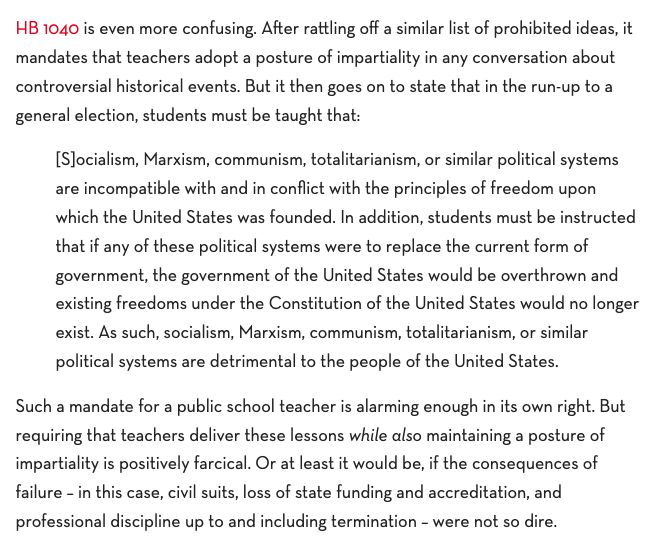
BREAKING: Over the last three weeks, 71 educational gag orders (aka "anti-CRT bills") have been introduced or prefiled. That's more than half of 122 proposed since January 2021. And they're getting worse.
pen.org/steep-rise-gag…
pen.org/steep-rise-gag…

In this report, I focus on bills from a single state -- Indiana -- to show just how bad this new crop of bills truly is. The legislation I profile would regulate speech in public AND private K-12, colleges and universities, public libraries, and state agencies.
These are bills with extraordinarily draconian punishments, including private rights of action, professional discipline, monetary fines, and loss of state financial support and accreditation. Simply put, they are built to terrify.
Perhaps worst of all, the way these bills are put together, they are literally *impossible* to satisfy. Imagine you're a new hire in some public school outside Indianapolis. It's the first day of term and you're excited to meet your class. Then you're told the following: 

But perhaps most alarming of all is how these bills would handle "school transparency". Maybe you've heard about this term already. It's the hot new thing in rightwing moral panic and cons are pretty jazzed about it. After all, who could possible object to transparency?
Don't be fooled. Many of these bills are very, very extreme. Once you take a look under the hood, you'll find some very dark things lurking about. 



That's all in the Round Up. The real prize, however, is the Educational Gag Order Index. It's an up-to-date list of every law and bill out there right now. In it, you'll see what the bills regulate, how they do it, and the penalties for violators.
docs.google.com/spreadsheets/d…
docs.google.com/spreadsheets/d…
In terms of comprehensiveness and detail, there's nothing out there I know of that's equivalent.
For more on the report and these bills, be sure to check out this article by @ThePlumLineGS. He gives a great overview of what's at stake and why you should care.
washingtonpost.com/opinions/2022/…
washingtonpost.com/opinions/2022/…
• • •
Missing some Tweet in this thread? You can try to
force a refresh




